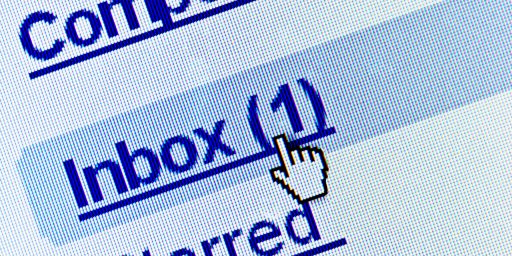The Social Psychology of Email
The fear of missing out is strong.

Author and computer science professor Cal Newport takes to the pages of the New Yorker to argue “Email is making us miserable.” He begins with more-or-less familiar-to-me matters:
To study the effects of e-mail, a team led by researchers from the University of California, Irvine, hooked up forty office workers to wireless heart-rate monitors for around twelve days. They recorded the subjects’ heart-rate variability, a common technique for measuring mental stress. They also monitored the employees’ computer use, which allowed them to correlate e-mail checks with stress levels. What they found would not surprise the French. “The longer one spends on email in [a given] hour the higher is one’s stress for that hour,” the authors noted. In another study, researchers placed thermal cameras below each subject’s computer monitor, allowing them to measure the tell-tale “heat blooms” on a person’s face that indicate psychological distress. They discovered that batching in-box checks—a commonly suggested “solution” to improving one’s experience with e-mail—is not necessarily a panacea. For those people who scored highly in the trait of neuroticism, batching e-mails actually made them more stressed, perhaps because of worry about all of the urgent messages they were ignoring. The researchers also found that people answered e-mails more quickly when under stress but with less care—a text-analysis program called Linguistic Inquiry and Word Count revealed that these anxious e-mails were more likely to contain words that expressed anger. “While email use certainly saves people time effort in communicating, it also comes at a cost, the authors of the two studies concluded. Their recommendation? To “suggest that organizations make a concerted effort to cut down on email traffic.”
While I don’t find email per se stressful, I do find unnecessary work emails, and spam generally, frustrating. My workplace, unlike any other employer I’ve had in the email era, has somehow managed a culture where evening, weekend, and holiday emails are incredibly rare despite multiple directors in my seven-plus years. But our immediate higher headquarters has not and, worse, allows any yahoo who feels like it to send emails on subjects that are likely to interest a very small and knowable subset of the population to every single person in the huge larger organization.
Other researchers have found similar connections between e-mail and unhappiness. A study, published in 2019, looked at long-term trends in the health of a group of nearly five thousand Swedish workers. They found that repeated exposure to “high information and communication technology demands” (translation: a need to be constantly connected) were associated with “suboptimal” health outcomes. This trend persisted even after they adjusted the statistics for potential complicating factors such as age, sex, socioeconomic status, health behavior, body-mass index, job strain, and social support. Of course, we don’t really need data to capture something that so many of us feel intuitively. I recently surveyed the readers of my blog about e-mail. “It’s slow and very frustrating. . . . I often feel like email is impersonal and a waste of time,” one respondent said. “I’m frazzled—just keeping up,” another admitted. Some went further. “I feel an almost uncontrollable need to stop what I’m doing to check email,” one person reported. “It makes me very depressed, anxious and frustrated.”
Again, I’m not wired in quite that way but do have a much shorter attention span than I once did. And, even with the aforementioned work culture in place, I nonetheless check work email multiple times a day even on weekends—or, indeed, even when I was on a six-month sabbatical.
When employees are miserable, they perform worse. They’re also more likely, as the French labor minister warned, to burn out, leading to increased health-care costs and expensive employee turnover. A Harvard Business School professor found that giving a group of management consultants predictable time off from e-mail increased the percentage of them who planned to stay at the firm “for the long term” from forty per cent to fifty-eight per cent.
I suspect my relative immunity from stress over this is a function of what I do for a living. Hell, I’m writing this blog post to procrastinate from revising a long professional journal article. It’s the job/career paradox Chris Rock cautioned us about years ago.
Regardless, Newport takes an unexpected twist:
Many in the business community tend to dismiss the psychological toll from e-mail as an incidental side effect caused by bad in-box habits or a weak constitution. I’ve come to believe, however, that much deeper forces are at play in generating our mismatch with this tool, including some that get at the very core of what drives us as humans.
The need to interact with each other is one of the strongest motivational forces that humans experience. As the psychologist Matthew Lieberman explains in his book “Social: Why Our Brains Are Wired to Connect,” the social networks encoded in our neurons are linked to our pain systems, creating the intense feelings of heartbreak that we feel when someone close to us dies, or the total desolation that we might experience when we are isolated from other people for too long. “These social adaptations are central to making us the most successful species on earth,” Lieberman writes.
The flip side of an evolutionary obsession with social interaction is a corresponding feeling of distress when it’s thwarted. Much in the same way that our attraction to food is coupled with the gnawing sensation of hunger in its absence, our instinct to connect is accompanied by an anxious unease when we neglect these interactions. This matters in the office, because an unfortunate side effect of overwhelming e-mail communication is that it constantly exposes you to exactly this form of social distress. A frenetic approach to professional collaboration generates messages faster than you can keep up—you finish one response only to find that three more have arrived in the interim, and, while you are at home at night, or over the weekend, or when you are on vacation, you cannot escape the awareness that the missives in your in-box are piling up ever thicker in your absence.
As a general rule, I much prefer email and other asynchronous communication methods to phone calls and office drive-bys. Indeed, I tend to be annoyed when people call or drop in unexpectedly in that they’re interrupting whatever I was doing, whereas I can choose when to check texts (I generally leave the volume off) or emails.
But, apparently, FOMO is really hard-wired. Newport describes in some great detail an obviously-artificial experiment in which people were prevented from taking calls on their cell phones
Rationally speaking, the subjects in this experiment knew that missing a call was not a crisis, as people miss calls all the time, and they were clearly engaged in something more important in the moment. Indeed, in many cases, the subject’s phone had already been set to silence mode, which the researchers surreptitiously turned off as they moved the phone across the room. This means that the subjects had already planned on missing any calls or messages that arrived during the experiment. But this rational understanding was no match for the underlying evolutionary pressures that have ingrained the idea that ignoring a potential connection is a really bad idea. The subjects were bathed in anxiety while their rational minds, if they had been asked, would have likely responded that there was nothing going on in the laboratory worth worrying about.
Newport argues,
The missed connections in an ever-filling e-mail in-box sound these same Paleolithic alarm bells—regardless of our best attempts to convince ourselves that this unanswered communication isn’t critical.
He describes a real-world experiment designed to alleviate this stress:
This effect is so strong that when Arianna Huffington’s company, Thrive Global, explored how to free its employees from this anxiety while they were on vacation (when the knowledge of accumulating messages becomes particularly acute), it ended up experimenting with an extreme solution, called Thrive Away. If a Thrive employee sends an e-mail to a colleague who is on vacation, the sender receives a note that the colleague is away and the message is automatically deleted. In theory, a simple vacation auto-responder should be sufficient—as it tells people sending a message not to expect a reply until the recipient returns—but logic is subservient in this situation. No matter what the expectations, the awareness that there are messages waiting somewhere triggers anxiety, ruining the potential relaxation of a person’s time off. The only cure is to prevent the messages from arriving altogether. Huffington said, “The key is not just that the tool is creating a wall between you and your email; it’s that it frees you from the mounting anxiety of having a mounting pile of emails waiting for you on your return—the stress of which mitigates the benefits of disconnecting in the first place.”
But Newport argues,
A tool like Thrive Away might temporarily alleviate the social stress of the way that we work, but we cannot ignore the fifty or so weeks a year when we’re not on vacation. As long as we remain committed to a workflow based on constant, improvised messaging, we will remain in a state of low-grade anxiety. To return to our motivating question, there are many reasons why e-mail makes us miserable. It creates, for example, a tortuous cycle that increases the amount of work on our plate while simultaneously thwarting, through constant distraction, our ability to accomplish it effectively.
Moreover, he makes a point that any regular OTB commenter can appreciate:
We’re also, it turns out, really bad at communicating clearly through a purely written medium—all kinds of nuances are lost, especially sarcasm, which leads to frustrating misunderstandings and confused exchanges.
Regardless, he contends,
But lurking beneath these surface depredations is a more fundamental concern. The sheer volume of communication generated by modern professional e-mail directly conflicts with our ancient social circuits. We’re miserable, in other words, because we’ve accidentally deployed a literally inhumane way to collaborate.
Understanding these forces provides more than just catharsis, as these efforts can also help us to better understand what is needed to improve our professional culture. In recent years, I’ve been advocating for wider use of shared project-management systems that simplify the task of identifying who is working on what and how it is going. If you combine these systems with regular, short status meetings, you can significantly reduce the number of back-and-forth messages required to organize a team. When viewed abstractly, the overhead of implementing such a system might seem wasteful, given that tools like e-mail are much simpler and more flexible. But when this structured approach is considered in the context of how communication overload induces misery, it suddenly makes more sense.
More generally, once you move past just optimizing for speed or convenience, and begin instead to look for ways to minimize unstructured communication, numerous potential innovations emerge. The software-development company Basecamp, for example, makes use of regularly scheduled office hours: if someone has a technical question for a given expert, he or she can’t just shoot an e-mail but has to wait until the expert’s next office hours to make a query. In a book about Basecamp’s workplace culture, published in 2018, the co-founders admitted that, at first, they were worried that their employees wouldn’t put up with having to wait to talk to an expert, instead of just “pinging” the person in the moment. Their concerns were unfounded. “It turns out that waiting is no big deal most of the time,” they write. “But the time and control regained by our experts is a huge deal.”
Another innovation that I’ve seen have been successful experiments in moving past the paradigm of associating e-mail addresses with individuals. When an address is instead assigned to a specific client, or to a specific type of request, and monitored by multiple different employees, it can go a long way to relieving the deeply-ingrained anxiety that we are ignoring those who need us.
It’s fascinating stuff, although I’m skeptical we’ll move past email any time soon. Slack, Basecamp, and other tools have definitely proliferated in some industries—but I honestly don’t know to what extent they’ve simply been piled on top of email and other forms of communication.





Thrive Away deleting the message is a cool idea I never thought of.
I find dealing with voice mail and phone calls far more distracting than email or texting. There’s usually no reason someone who insists on talking on the phone can’t communicate with you via email, texting, or Internet based messaging. Personally, I find myself making far fewer phone calls with my “phone” than I used to, and the fact that basically you can’t text or email while driving means I have to have my “phone” on silent mode when I drive, which is of course the safest option.
My employer, a college, advertised all faculty and staff email addresses on the college website, with the result that about 95% of what appears in my inbox I can delete without reading. This doesn’t cause me any particular stress, but I do have to clean the box out once or twice a day or else it would get out of hand quickly.
@Doug Mataconis:
Safest and, often, the most pleasant. And great to see you again (so to speak)!
I must be broken. I just don’t care if I miss out.
I strongly prefer phone and drive-by engagements for conversations where either (1) I don’t want there to be a written record in management’s hands, or (2) I think tone of voice and nuance are going to be important in the conversation. Maybe I’m just paranoid, but there’s a lot of overlap in those categories.
I also strongly prefer chat or voice to email or text when I expect an interactive conversation with a lot of back and forth, especially if more than 2 people are involved. I wish more people routinely used the chat features we have available, but adoption of those seems very low, especially among the older staff.
I’ve three email frustrations.
1) the inability of other people to read their email, or remember what they’ve read. If I had a dime for every time someone told me “Why haven’t you emailed the notice of X client’s contract award,” and I was able to show them their read receipt for that very notice, I’d be able to buy Canada.
2) Related to the above, their inability to forward an email to people under them who need the information. The aforementioned notices by now need to be sent to between 25 and 35 individual recipients, rather than to just the three to five relevant department heads.
3) Clients who sen urgent requests by email late in the day, usually when I’m about ready to go home. Or who send such requests on the weekend.
Psychology. Doesn’t bother me at all to miss a phone call. If my phone isn’t readily at hand I’ll cheerfully let it ring until it stops, assuming if it’s important they’ll leave a message. I’ll catch up on messages, email, and texts when it’s convenient. It drives my wife crazy to see me ignore a call. She can’t stand to not immediately check an email or text ping, much less a phone call. Except for numbers she thinks are auto warranty peddlers.
@Doug Mataconis:
First,
Hi, glad to see you on these pages. I’ve missed your POV.
A distinction I useful is that “business” communications are just as effectively carried out by email, or text. As contrasted with “interpersonal comms” are more effective when I can hear the subtle nuances of a phone call.
What does bother me with text messages particularly is that it seems that I have to repeat the principle question or request at the end of the text as well as at the beginning. What I’ve observed (among my contacts), is that by the time they display the text (particularly on a mobile device), they have completely forgotten what the initial question was. It seems like: 1) make the point , 2) explain the point, 3) make the point again.
@gVOR08:
Several months ago I faced up to the degree of hearing loss I have and bought a pair of aids. They are Bluetooth capable, can act as a headset, and are usually paired to my phone. On occasion this leads to me hearing my phone ring via the aids with zero directional cues and having no idea which of the usual several places I left it.
@Michael Cain: I’ve worn hearing aids for years. They’re why I wear masks with behind the head straps. With eyeglasses it’s already crowded behind my ears. Yes, no directional cue to my phone. But even when I know where it is, usually on the charger, I often let it ring, although the ring is deafening on the Bluetooth aids.
@Michael Cain: Also, for whatever it’s worth, I got a drier box for overnight use. Has a UV lamp and a desiccant cartridge. Largely ended the earaches I started getting when I first got aids and keeps them a lot cleaner.
I get between 250-500 emails per day. Of those, 80% I have to read and/or respond to. 20% are spam and BS that I can ignore.
Given the volume, I have to make sure I flag, notate, or otherwise put a reminder in place so I can come back when I have to to address it. I’ve gone from zero emails in my inbox to over 10,000 in less than three weeks. I now make it a priority to empty the email inbox daily before I go to sleep.
Otherwise I fall too far behind.
@OzarkHillbilly:
I’m worse. I’ve seen what email brings, and have a fear of not missing out. It’s all shit, especially at work. I barely check it — if it’s important, someone will Slack me and ask me to respond to my email. I’ve also turned off the sounds on Slack, so…
It turns out, I am a terrible employee.
I also have the default ringtone on my phone set to silence. A very few people get allowed to interrupt me — basically just my closest friends.
(The phone call from the pager at work also has a real ringtone, so I guess someone could page me to tell me to check the Slack that tells me to check the email…)
I delete probably 80% of emails without looking. Email doesn’t stress me at all. The joys of living and working outside of a hierarchy.
@Michael Cain: @gVOR08: You guys must have better hearing aids than the one I use (other ear too far gone for an appliance) because my bluetooth settings hardly work at all. And being totally deaf in one ear makes for no echolocation at all. Sorry you guys suffer from that, too. It’s a nuisance.
@Michael Reynolds:
I agree. And yes it really is me.
@Doug Mataconis:
And about time, too. Welcome back.
Another hearing aid user here. Never figured out how to get it working for my phone or headsets, but my hearing’s not so bad yet that that is critical. I take it that gOVR08 is using BTEs like me. What about the rest of you?
Regarding the topic, luckily I do not receive too much, and a boss a long time ago told me that it is rare that anything truly needs to be answered urgently. So I don’t sweat it. And perhaps clearly I’m not as important to things running smoothly as some of you others are (e.g. EddieInCA).
As a software developer following the Scrum/Agile model where we have a quick daily meeting along with project software management where everyone can see what others are doing, the amount of emails or Slack interruptions has been manageable compared to traditional development.
@Franklin: I’ve used both CICs and BTEs. I don’t like the “finger in my ear” feel of a mini-CIC. Fortunately, my hearing in my good ear is still good enough that I can use the open architecture end on my current BTE.